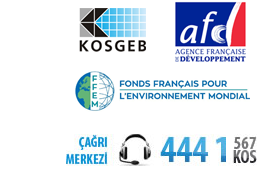Energy efficiency improvements refer to a reduction in the energy used for a given service (heating, lighting, etc.) or level of activity. The reduction in the energy consumption is usually associated with technological changes, but not always since it can also result from better organisation and management or improved economic conditions in the sector (“non-technical factors”).
To economists, energy efficiency has a broader meaning: it encompasses all changes that result in decreasing the amount of energy used to produce one unit of economic activity (e.g. the energy used per unit of GDP or value added). According to the calculations there are two types of energy intensity; Primer Energy Intensity and Final Energy Intensity. Primer Energy Intensity is calculated by the primer energy consumption divided to GDP. Final Energy Intensity is calculated by the final energy consumption divided to GDP. Energy efficiency, also called energy intensity in macro level, is associated with economic efficiency and includes technological, behavioural and economic changes.
Energy efficiency is an important step for protection of the world. Increasing energy efficiency will contribute to reduce dependence on foreign energy sources which is a heavy burden on the economy Using renewable energy more will cause using less fossil fuels and less greenhouse gas emissions and less air pollution and thus a smaller carbon footprint.
Energy demand of Turkey has been increasing and getting more important day by day. Although in the last quarter of 2008 and throughout 2009, the continuing economic crisis led to a decline in demand, the average annual primary energy consumption of Turkey has increased steadily at a rate of 4-5% in the years 1990-2012. In 2012, primary energy consumption of Turkey was 121 million toe (tons of oil equivalent) and with this value Turkey was one of the 25 largest energy consumer countries in the world. However, only 24-29 % of the requirements were obtained from domestic sources in recent years. The main domestic energy sources are coal (mainly lignite), hydro power, biomass and oil.
This situation, has been forcing of the Country’s economy in terms of the balance of payments and security of energy supply and hense the gap between supply and demand is growing every year. As a result As a result, costs paid to Country’s energy imports is increasing with each passing year. In 2012, 60 billion dollars has been paid to energy imports. This figure correspond 23% of all country imports. Therefore, any increases in energy inputs could affect negative of the the Country’s economy.
On the other hand, Turkey’s primary energy intensity in 2009 was realised 0.27 toe (on the basis of 2000 U.S.$). This figure is above of 0.18 which is the OECD average. This means, the energy to produce the same added value is more than double energy of the OECD countries. Likewise, primary energy intensity of Turkey in Euro is 233 kEP/1000 € (kEP: kilograms of oil equivalent) while average of EU (27) is 152 kEP/1000 €. For some EU countries this value are: Denmark : 93 kEP/1000 €, Switzerland: 80 kEP/1000 €, Bulgaria: 664 kEP/1000 €, Estonia: kEP/1000 €.
As can be seen the graphs above, final energy intensity of Turkey in 2008 is very high from the developed countries. For these reasons, efficient use of energy is a vital issue for our Country. Energy intensity should be reduced by Increasing energy efficiency in existing facilities, and by choosing energy efficient technology and equipments in the new facilities to be installed.
On the other hand, Today, Turkey has confronted with the climate change visible results as well as oil and gas prices. This situation also threatens the security of supply. Energy efficiency is the easiest, cheapest and most direct way to turn these threats into real opportunity.
The main driver for businesses to improve energy efficiency is usually economic. Improved energy efficiency leads to reduced costs, making a business more efficient and hence more competitive. However, the only economic reason for improving energy efficiency in SMEs is not alone reducing energy bills, The use of more modern process equipment, which tends to be more controllable, can also improve product quality and consistency. Achieving the same results while using less energy helps reduce dependence on imported energy, and helps control the price of energy. Using less energy reduces emissions of a wide range of pollutants, which helps improve air quality locally, can reduce phenomena such as acid rain, and mitigates the effects of climate change globally through reduced emissions of Carbon Dioxide and water vapour. Therefore in order to increase energy efficiency in SMEs, studies should be initiated without any delay


![wcnKPgo[1]](http://kobienver.com/en/wp-content/uploads/2014/06/wcnKPgo1.png)
![BhVLzdZ[1]](http://kobienver.com/en/wp-content/uploads/2014/06/BhVLzdZ1.png)
![5ggZCli[1]](http://kobienver.com/en/wp-content/uploads/2014/06/5ggZCli1.png)
![bxiUkbS[1]](http://kobienver.com/en/wp-content/uploads/2014/06/bxiUkbS1.png)
